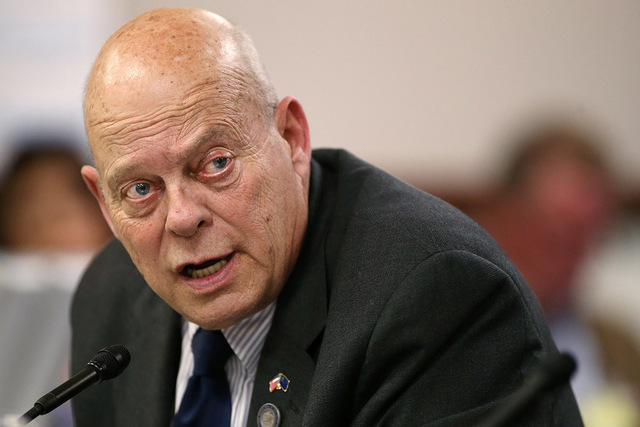‘Students’ rights’ bill debated in Legislature

CARSON CITY — The sponsor of a bill heard in the Assembly Education Committee on Monday said he wants to protect students like 2008 Henderson valedictorian Brittany McComb, whose commencement speech was cut off when she spoke about her Christian faith.
Assemblyman Jim Wheeler, R-Gardnerville, said Assembly Bill 120 would codify in Nevada law the constitutional rights of freedom of religion and provide for a grievance process if those rights are violated.
The bill says students at public schools are entitled to pray to the same extent they are allowed to meditate, reflect or speak on nonreligious matters.
But opponents said the language does not codify existing rights, but expands religious rights to the point where it would create disruptions in schools and potentially lead to an increase in lawsuits.
It is one of two bills aimed at the rights of students in the public school system. The second bill, AB121, was delayed because of time constraints. That measure, dubbed the “Pop-Tart” bill by some would prohibit a school from disciplining a student for simulating a firearm, wearing clothing that depicts a firearm or brandishing a food item to simulate a firearm.
No immediate action was taken on the religious freedom measure. But it prompted lengthy questioning from members of the committee about whether it might have the unintended consequence of causing more legal problems than it seeks to prevent. It also provoked a debate about the separation of church and state and the purpose of a public education.
Assemblyman Pat Hickey, R-Reno, questioned whether the Legislature should micromanage local school districts on such issues. He also noted that such disputes have not been common in Nevada.
Wheeler said that while such disputes are not common here now, there are attacks on religious freedom across the country that could be duplicated here.
In McComb’s case, a federal court ruled against her lawsuit against Foothill High School officials. That decision was upheld by the 9th circuit and the U.S. Supreme Court declined to take the case.
There was plenty of testimony on both sides of the issue.
Clark County school teacher Angie Sullivan testified against the bill, saying she needs all the time she has with her students to help them become proficient.
The ACLU of Nevada opposed the bill, calling it in prepared testimony “an unnecessary and potentially unconstitutional attempt to subject students to prayer and proselytizing at school events that could be harmful to LGBT communities and people of diverse religious faiths.”
The ACLU said students already possess broad free-exercise rights in public schools, protected by existing law including the First Amendment, the Nevada Constitution and various federal and state laws.
Vanessa Spinazola, legislative and advocacy director for the ACLU, said the bill goes further than codifying existing religious rights. It would allow religious beliefs to pervade every moment of the school day, she said.
But the Freedom From Religion Foundation, a national nonprofit group that works to ensure the separation of religion and government, endorsed the bill for seeking to clarify that religious speech is permissible as long as there is no school involvement.
The provisions of the bill would also protect atheist, agnostic and other students who are regularly discriminated against when they demand equal access to form student groups or otherwise express their nonreligious views, the group said in its written testimony.
The state’s two largest school districts were neutral on the bill.
Craig Stevens, representing the Clark County School District, said the district works to accommodate student religious beliefs with moments of reflection before the school day begins and through participation in clubs.